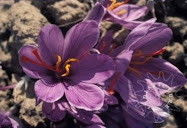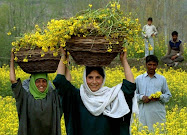 Tomorrow is the eighth day of the bright fortnight of Jeshtha, briefly called Zeth-e-Aethum in Kashmiri. It is the auspicious day for KPs as it’s the birthday of Maa Raignya or Kheer-Bhawani of Tulmul in Kashmir, the most reputed temple of modern Kashmir and frequently visited by Kashmiri Pandits besides an essential part of the itinerary of almost all Kashmir Tourists. The KPs are deeply attached to Maa Raignya or more popularly called Kheer Bhawani of Tulmul, a low land dusky village about 20 Kilometers from Srinagar. The temple stands in the middle of a natural spring surrounded by a vast expanse called Deevi-Angun with beautifully laid age old flat rectangular stone slabs. Lots of old but fresh huge Chinar trees with generously extended foliage around the temple spring give the temple a celestial aura and serve as a canopy for the pilgrims to rest. The divine aroma is instantly felt when one enters the extensive complex.
Tomorrow is the eighth day of the bright fortnight of Jeshtha, briefly called Zeth-e-Aethum in Kashmiri. It is the auspicious day for KPs as it’s the birthday of Maa Raignya or Kheer-Bhawani of Tulmul in Kashmir, the most reputed temple of modern Kashmir and frequently visited by Kashmiri Pandits besides an essential part of the itinerary of almost all Kashmir Tourists. The KPs are deeply attached to Maa Raignya or more popularly called Kheer Bhawani of Tulmul, a low land dusky village about 20 Kilometers from Srinagar. The temple stands in the middle of a natural spring surrounded by a vast expanse called Deevi-Angun with beautifully laid age old flat rectangular stone slabs. Lots of old but fresh huge Chinar trees with generously extended foliage around the temple spring give the temple a celestial aura and serve as a canopy for the pilgrims to rest. The divine aroma is instantly felt when one enters the extensive complex.The small temple built in white marble, a masterpiece construction shines like a jewel in the middle of a hexangular crystal clear spring with its water miraculously changing colours indicating the coming good and bad times for the people. The pink red colour is a forecast indication of a happy and prosperous time while the black is the most inauspicious colour forecasting some worst impending misfortune.
Before the displacement of Pandits from Kashmir in 1990 the day used to be a major festival when almost all of them young and old came from far and near to pay obeisance and the huge complex could hardly accommodate them. Extensive arrangements for the transport, security and maintenance of thousands of pilgrims were made by the Government and social agencies for the event. The main attraction was the evening AARTI when thousands of devotees waving lighted Jyotis in their hands sang the preferred hymns of the goddess and the whole atmosphere reverberated with Maa Raignya’s generous bounties to be pocketed by her devotees.
Maa Raignya is considered a guardian deity by all Kashmir Pandits and every Ashtami of the bright fortnight is sacred to Her so they observe a fast in Her honour on this day round the year and it was a routine with lots of them to visit Tulmul on Ashtami and stay there for the night in the lap of the divine mother and ask for blessings and forgiveness for all their sins. The whole complex is maintained and guarded efficiently nowadays by the CRPF security personnel.
One of the popular legends connected with the Goddess is worth a mention. It’s said during Ramayana period the Goddess called Shyama had her abode in Sri Lanka ruled by the demon king Ravana who was Her fervent devotee and performed regular ablutions to her.When Ravana got Maa Sita the royal consort of Shri Rama forcibly during exile from their forest home to his palace the Goddess was annoyed beyond measure and she commanded Hunuman to take her on her shoulders along with her numerous snakes to Sati-Desh the old name for Kashmir. The Goddess had an extensive survey of the valley with certain memorable landings at some places and settled finally in the marshy place of Tulmul, the present spot of the temple. Nobody knew about the presence of the deity for a long time till one day the Goddess appeared in the dream of a saintly Pandit of Srinagar and commanded him to find Her abode in the marshes of Tulmul. The Pandit took a small boat and ferried it across the marshes guided by a snake ahead of him until he reached the spot. Here the snake took a dip and disappeared. He took the clue and emptied here the earthen pitcher filled with milk got along by him. Thus started his regular visits at the spot and with passage of time the popularity of the place grew manifold as desired by the Goddess.
Ma Raginya is called Kheer Bhawani too because it’s said that Kheer prepared with rice, milk and sugar is Her preferred food and the devotees invariably prepare the dish on all Ashtamis, offer it to the Goddess and eat it as prashaad.
The visiting Pandits to the valley make it a point to pay obeisance to the Goddess. Once there they wish for the deliverance of their sins that has put the community to such telling circumstances that there seems no end to their miseries.
Let’s wish again that on the auspicious day of Jaishth Ashtami tomorrow the blessing of the Tulmul Goddess prove a boon for us all and thus end our misfortunes for all times to come.
Jai Maa Tripursundari, Ashtadashbuzi Durga !!!!!!

.jpg)



